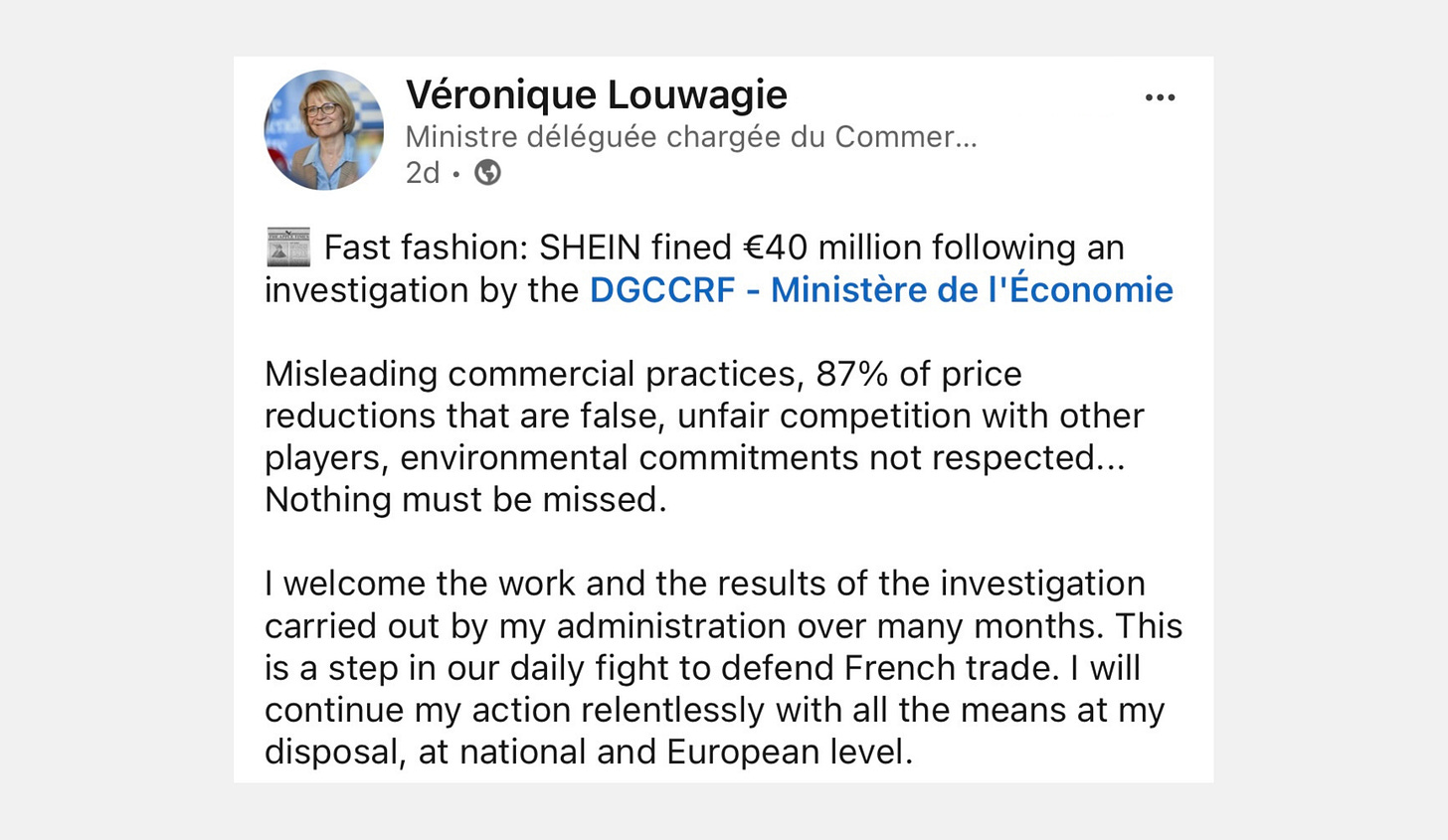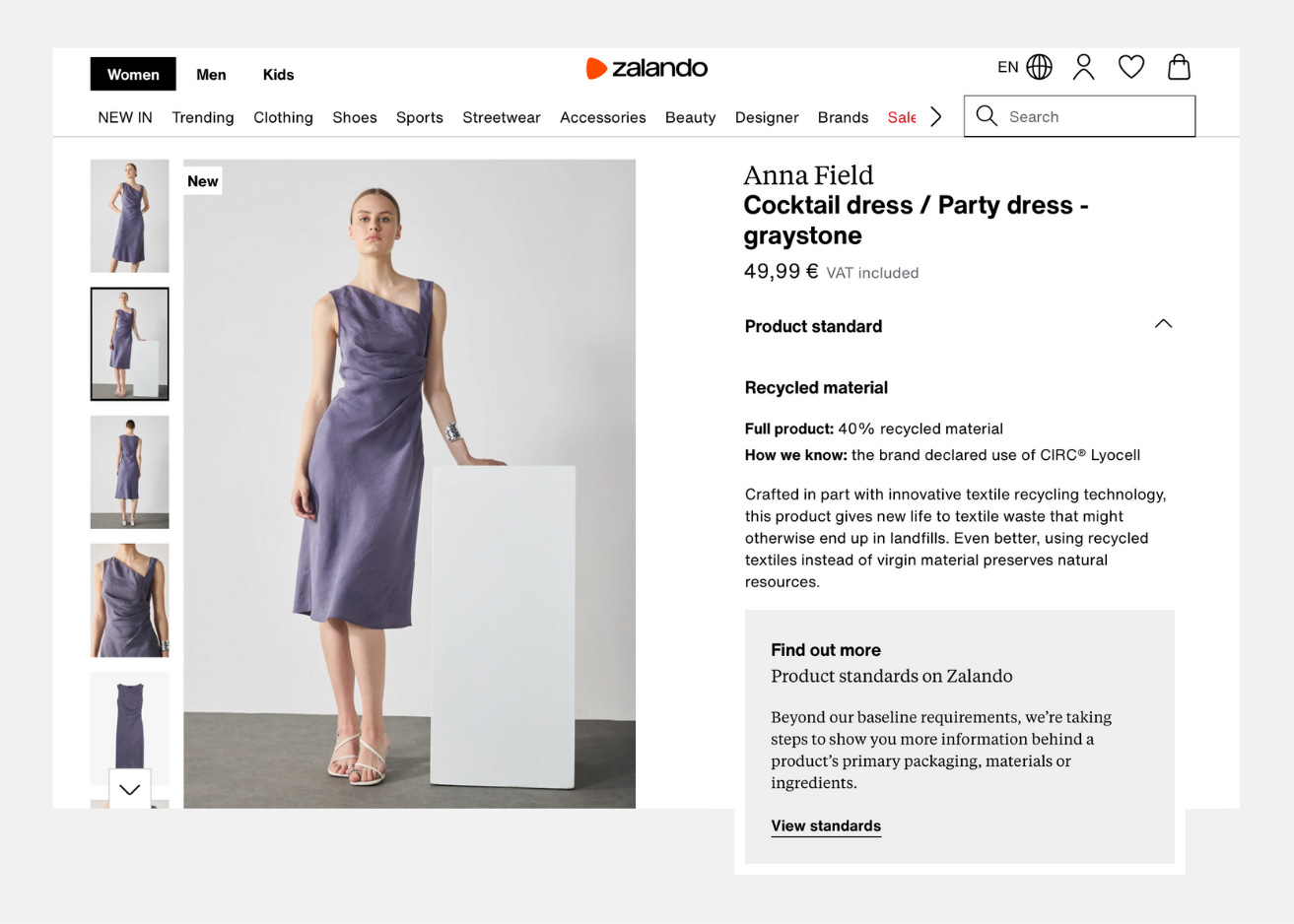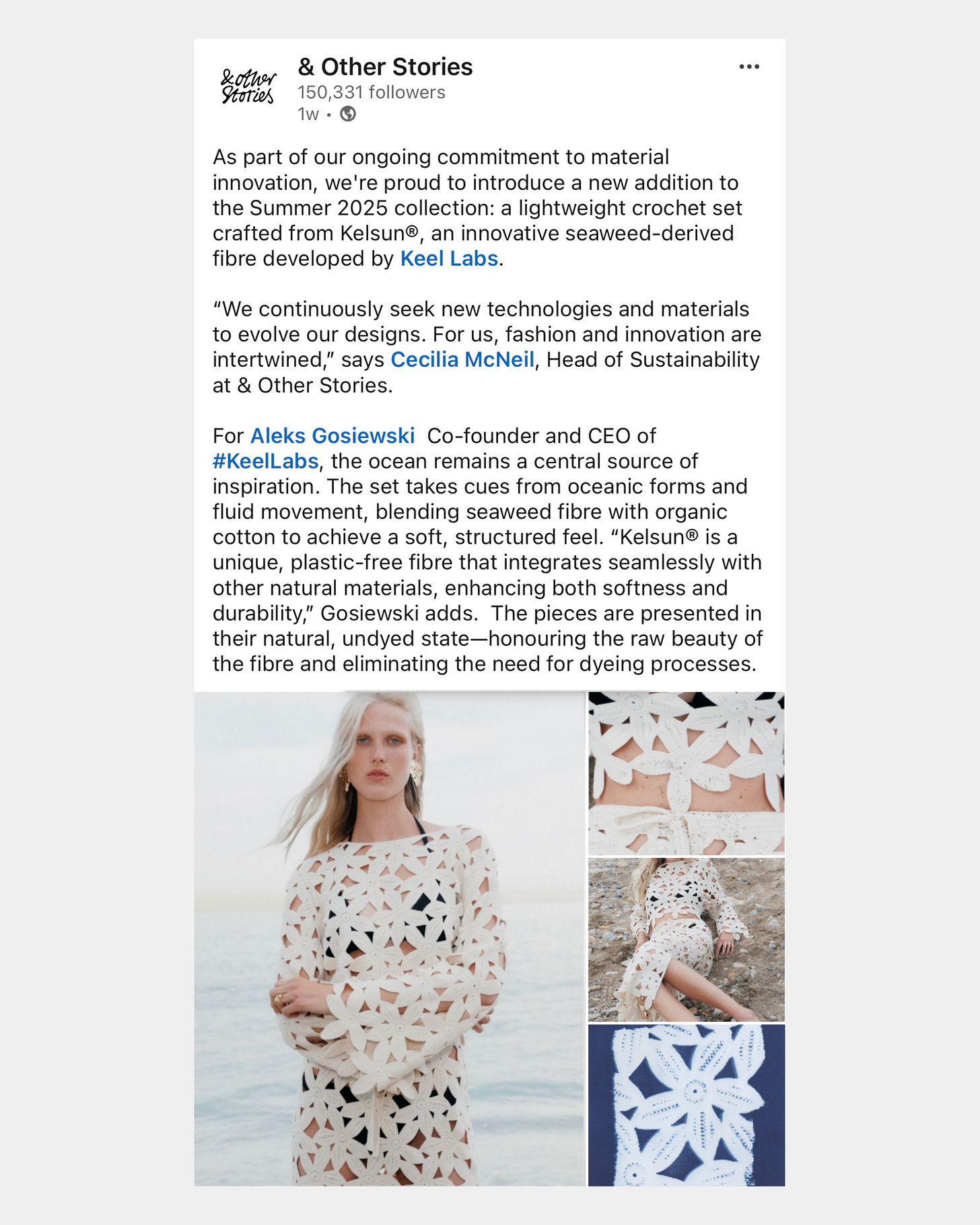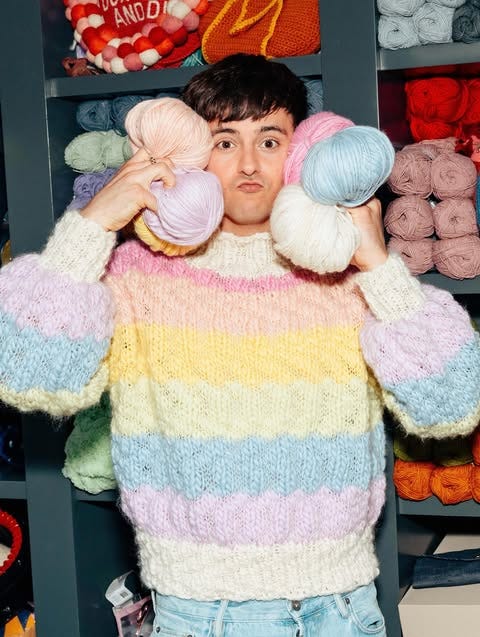A $47 Million Fine, a Stalled Greenwashing Bill, and Five-Year Optimism
Here's what happened in sustainable fashion news this week.
Welcome to Week/End, your quick-hit guide to the sustainable fashion news shaping the industry. Trusted by the people driving sustainability at global fashion brands, Week/End is what sustainability directors, climate leads, and circularity managers read for context, clarity, and culture—in one single email.
In today’s Week/End recap:
France hit Shein with a $47 million fine for deceptive pricing and greenwashing.
Major fashion houses like LVMH and Kering see no significant near-term financial threat from climate change, according to a Business of Fashion analysis.
An update on the stalled EU Green Claims Directive.
Want to work in sustainable fashion? Our NEW Sustainable Fashion Jobs report breaks down what brands are looking for and how to get hired.
PLUS: 🆕 sustainability roles from New Balance, Steve Madden, Lululemon, H&M Group, and more are on the SFF Job Board. Become a paid sub to get full access and unlock your next career move.
Fashion Says It’s Ready for Climate Change. Experts Aren’t So Sure.
What's Going On:
An article from Business of Fashion highlights a major gap between the reality of climate change and what the fashion industry is officially reporting. Despite heatwaves disrupting Men's Fashion Week in Paris, major fashion companies are telling investors they don’t see climate change as a major financial risk anytime soon.
The Details:
Under the EU's new Corporate Sustainability Reporting Directive (CSRD), brands have to disclose their climate risks. Business of Fashion points out that in these early filings, companies like LVMH, Kering, and Inditex all said the risk to their bottom line is limited for the next five years. They argue their global supply chains and insurance offer enough protection from disruptions like droughts or floods.
Why It Matters:
Experts quoted by BoF worry the industry is downplaying a fundamental threat. They warn that the data used for predicting risk is quickly becoming out of date as the climate changes faster than expected. While fashion giants believe their supply chains are flexible enough to handle the disruption, one expert warned, “There won’t be any places for people to shift” when multiple regions face crises at once. The analysis suggests the industry's focus on short-term problems, like tariffs, is causing it to overlook a much bigger, long-term challenge.
France Hit Shein With a $47 Million Fine for Deceptive Pricing and Greenwashing
What Happened:
France’s consumer watchdog (DGCCRF) fined the fast-fashion giant €40 million ($47 million) for "deceptive commercial practices." After a nearly year-long investigation, regulators found that more than half (57%) of Shein's advertised discounts offered no real price drop, with the company often inflating prices right before putting them "on sale."
Context:
The fine wasn't just for fake discounts. Regulators also called out Shein for its unsubstantiated environmental claims, specifically its promise to cut greenhouse gas emissions by 25%, which the company could not justify. This two-pronged penalty for both deceptive pricing and greenwashing is one of the most significant enforcement actions taken against a major fast-fashion player.
The Bigger Picture:
Coming just as France pushes forward a separate, new bill to ban ultra-fast fashion advertising, this fine shows the government is attacking the business model on all fronts. It’s a clear signal that the era of operating with limited oversight is over, and that French regulators are now policing not just what these companies sell, but exactly how they sell it.
Update: The EU’s Landmark Green Claims Directive Isn’t Dead, but It’s Stalled by Political Infighting
After confusing mixed signals, the European Commission clarified it did not withdraw its landmark anti-greenwashing law, but the proposal is now stalled. The reversal came after final negotiations were cancelled following a press briefing when Commission spokesperson Maciej Berestecki said that in its “current context” the Commission plans to withdraw the proposed Green Claims Directive. With the Polish Council presidency now pausing all talks and Italy withdrawing its support, the future of one of Europe's most ambitious efforts to fight greenwashing is in limbo.
Update: Trump’s ‘Big, Beautiful Bill’ is Set to Permanently End the De Minimis Loophole, for Everyone
On July 4th, President Trump signed new legislation into law that will permanently and globally eliminate the de minimis trade loophole by June 2027. The law codifies and expands on an executive order from May that had already blocked duty-free shipments from China and Hong Kong. Hailing the move as a landmark victory, the National Council of Textile Organizations (NCTO) argued the provision has long devastated workers and facilitated the entry of unethically made products. In a LinkedIn post, NCTO President and CEO Kim Glas called the change a win for American workers and families, thanking congressional leaders for closing the "dangerous provision."
COLLABORATIONS & INITIATIVES
Hot off the heels of becoming the first scaling partner for Circulose since its restart, Mango announced it's investing directly in recycling startup The Post Fiber taking a board seat to help scale its operations. This more hands-on deal has already resulted in a small capsule collection for its teen line, which uses a blend of the startup's post-consumer recycled fibers.
REPORTS & PAPERS
Textile Exchange released a new guide to help brands make credible claims about regenerative agriculture without getting into greenwashing trouble.
Want to work in sustainable fashion? Of course you do! Our new report is a data-backed roadmap to getting a job in sustainable fashion. We analyzed hundreds of roles to decode what hiring managers actually want right now. The report breaks down the non-negotiable skills you need, what to expect from roles in Europe vs. the U.S., and how to position yourself to land the job.
Funding
Portuguese pulp producer Altri is acquiring a majority stake in AeoniQ to scale production of its cellulosic yarn. The investment will fund the construction of the first industrial-scale factory for AeoniQ's cellulosic yarn, a material designed to be a biodegradable replacement for polyester.
What caught Week/End readers’ attention last week?
✅ A new Bain & Company x eBay report says most brands treat Digital Product Passports as a compliance checkbox—but they could unlock repair, resale, and services that give 65% of the value back to consumers.
✅ An Earthsight investigation links Coach’s leather supply chains to illegal cattle ranching in the Brazilian Amazon. Key tanneries in the supply chain are certified by the Leather Working Group, raising questions about the limits of certification as proof of sustainability.
✅ Two global manufacturing groups, IAF and ITMF, launched the Apparel and Textile Transformation Initiative (ATTI), a new program to put suppliers—not brands—in charge of creating national decarbonization roadmaps.
A Quick Note on This Section: I’ve always believed that one of the most important, and most overlooked, pieces of the sustainability conversation is consumer behavior, psychology, and how it intersects with sustainability. We can create the most sustainable materials and systems, but none of it matters if we don’t have consumer participation. The "In the Zeitgeist" section of this newsletter has been where we spotlight how sustainability is breaking into the mainstream and adding to culture. But moving forward, I’m giving it a more focused mission. This section will now be where I briefly explore those ideas, all "Powered by Green Behavior," my personal newsletter where I do my deepest analytical work on consumer psychology. If you enjoy these insights, I think you'll love what we're building over at Green Behavior.
This week, recycling innovator Circ continued its strategic push to prove its materials can succeed across every segment of the fashion industry. Following high-profile collections with luxury designer Christian Siriano and fast-fashion giant Zara, Circ launched a capsule with Zalando, Europe’s leading online fashion platform. While the Zara partnership proved the material could work at mass-market scale, this collaboration tests a different challenge: can a recycled garment win in a competitive, multi-brand e-commerce environment? With no social media promotion to drive traffic, the collaboration creates a true A/B test: can a recycled garment win in a competitive, multi-brand e-commerce environment on design merits alone? Its success hinges on customers finding and choosing the product organically, making it a high-stakes test of whether sustainable fashion is best normalized by first selling a great dress that just so happens to be sustainable.
In contrast, & Other Stories is betting that the raw, organic texture of seaweed can be the main selling point. Actively promoting the collaboration on social media, their new crocheted set with Keel Labs was designed to showcase the unique feel of its Kelsun fiber, even leaving it undyed. Instead of letting the material fade into the background, this collaboration tests if ‘made from seaweed’ can be the central aesthetic for a mainstream audience.
A new partnership is bringing the conversation around natural fibers to a mainstream stage. Olympic diver Tom Daley's knitwear brand, Made With Love, teamed up with The Woolmark Company to launch a collection of knit kits using 100% Merino wool yarn, sourced and spun in the UK. While the collaboration centers on a knitting kit, its cultural relevance lies in how it leverages a celebrity platform to champion the principles of slow fashion. By spotlighting the tangible benefits of wool and the mindful act of making your own clothing, the partnership serves as a compelling case study in making sustainable practices more visible and accessible to a broader audience.
Want a career in sustainable fashion? Start here!
The SFF Job Board is your go-to hub for sustainability roles in fashion. From ESG, impact, and circularity to compliance, traceability, and transparency—we only post jobs that sit at the intersection of fashion and sustainability. Nothing else.
New this week:
🆕 New Balance | Sustainability Manager
Boston, MA | Hybrid・Full‑Time・Senior-Level
↳ Apply here🆕 Steve Madden | Sr. Manager, Compliance & Sustainability
Long Island City, New York, United States | Hybrid・Full‑Time・Senior-Level
$100K/yr – $120K/yr
↳ Apply here🆕 Lululemon | Senior Program Manager, Circularity
Vancouver, BC, Canada | Full-Time | Hybrid
↳ Apply here🆕 H&M Group | Sustainability Environment Expert
Ho Chi Minh City, Vietnam | Full-Time・On-Site
↳ Apply here
📌 Paid subscribers get full access to the full job board + updates every week.


















